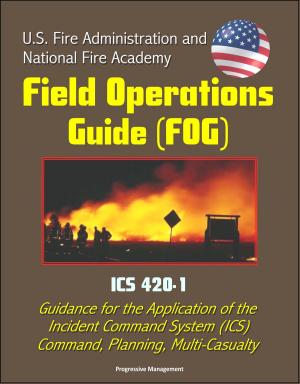National Defense Intelligence College Paper: Interrogation - World War II, Vietnam, and Iraq; al Qaeda Torture, Waterboarding, Bush, Cheney, CIA
Nonfiction, History, Military, Social & Cultural Studies, Political Science| Author: | Progressive Management | ISBN: | 9781310584473 |
| Publisher: | Progressive Management | Publication: | January 7, 2014 |
| Imprint: | Smashwords Edition | Language: | English |
| Author: | Progressive Management |
| ISBN: | 9781310584473 |
| Publisher: | Progressive Management |
| Publication: | January 7, 2014 |
| Imprint: | Smashwords Edition |
| Language: | English |
This unique and informative paper was produced by the National Intelligence University / National Defense Intelligence College. Topics and subjects include: Iraq, Lessons from World War II, al Qaeda torture techniques, waterboarding, President George W. Bush, Vice President Dick Cheney, General David Petraeus, CIA, General Hayden, Khalid Sheikh Mohammed, Japanese POWs, Spirit Warriors, Japanese Culture, Kamikaze Pilots, Hara-kari, Shinto Way of the Gods, Bushido (Way of the Samurai), Japanese-American Interrogation in World War II, Camp Ritchie, Camp Savage, Fort Snelling, Lessons from World War II, Geneva POW convention, Vietnam War interrogations, Army FM 2-22.3, Abu Ghraib, Donald Rumsfeld, Alberto R. Gonzales memo, Abuse of Detainees, Strategic Interrogations, Tactical interrogations.
By adding historical and practical context going back to U.S. policy and practice in interrogations during World War II, the Vietnam conflict, and the ongoing war in Iraq, this newest volume contributes to the high-profile public dialogue on how U.S. military and civilian agencies can best obtain information from prisoners of war and other categories of legal and illegal combatants without compromising the principles upon which the nation was founded.
This study is an ongoing effort to review what is known scientifically about interrogation and other forms of human intelligence collection and to chart a path to the future. The first author researched U.S. efforts during World War II to develop language and interrogation capacities to deal with our Japanese enemy. He found that military leaders, often working with civilian counterparts, created and implemented successful strategies, building on cultural and linguistic skills that substantially aided the war effort for the U.S. and its Allies. The second author studied the experiences of three successful interrogators during the Vietnam War. He suggests that policymakers and practitioners have much to learn from professionals who served effectively for years in the field educing information. This portion highlights the importance of a deep understanding of the language, psychology, and culture of adversaries and potential allies in other countries. The third author examined recent policy and practice with regard to tactical and field interrogations, especially with regard to the efforts of Special Forces soldiers in Iraq. He concludes that the "letter" of current doctrine contradicts its "intent." He offers recommendations that he believes are both consistent with the intent of military doctrine and likely to increase the effectiveness of U.S. interrogation practices in the field. Each of these studies demonstrates that thoughtful, pragmatic research can produce stimulating and useful knowledge that may aid 21st century decision-makers. Together these reports suggest that, by looking at both the distant and recent past, planners and operators can gain insights that may lead to future successes in educing information from adversaries.
The issue of so-called "enhanced interrogation techniques" has occupied the national agenda almost continuously since the first public revelations in April 2004 of Iraqi prisoner abuse by U.S. Army soldiers in Baghdad's Abu Ghraib prison. Intelligence interrogation, as interpreted and applied in a variety of ways throughout history, is one of humankind's oldest practices. The objective of this volume, Interrogation: World War II, Vietnam, and Iraq, is to inform a broad audience of intelligence professionals, policymakers, and the general public about intelligence interrogation techniques that truly enhance our chances for success in the Global War on Terrorism. The work reviews the current legal and operational status of enhanced interrogation techniques, as well as their origin.
This unique and informative paper was produced by the National Intelligence University / National Defense Intelligence College. Topics and subjects include: Iraq, Lessons from World War II, al Qaeda torture techniques, waterboarding, President George W. Bush, Vice President Dick Cheney, General David Petraeus, CIA, General Hayden, Khalid Sheikh Mohammed, Japanese POWs, Spirit Warriors, Japanese Culture, Kamikaze Pilots, Hara-kari, Shinto Way of the Gods, Bushido (Way of the Samurai), Japanese-American Interrogation in World War II, Camp Ritchie, Camp Savage, Fort Snelling, Lessons from World War II, Geneva POW convention, Vietnam War interrogations, Army FM 2-22.3, Abu Ghraib, Donald Rumsfeld, Alberto R. Gonzales memo, Abuse of Detainees, Strategic Interrogations, Tactical interrogations.
By adding historical and practical context going back to U.S. policy and practice in interrogations during World War II, the Vietnam conflict, and the ongoing war in Iraq, this newest volume contributes to the high-profile public dialogue on how U.S. military and civilian agencies can best obtain information from prisoners of war and other categories of legal and illegal combatants without compromising the principles upon which the nation was founded.
This study is an ongoing effort to review what is known scientifically about interrogation and other forms of human intelligence collection and to chart a path to the future. The first author researched U.S. efforts during World War II to develop language and interrogation capacities to deal with our Japanese enemy. He found that military leaders, often working with civilian counterparts, created and implemented successful strategies, building on cultural and linguistic skills that substantially aided the war effort for the U.S. and its Allies. The second author studied the experiences of three successful interrogators during the Vietnam War. He suggests that policymakers and practitioners have much to learn from professionals who served effectively for years in the field educing information. This portion highlights the importance of a deep understanding of the language, psychology, and culture of adversaries and potential allies in other countries. The third author examined recent policy and practice with regard to tactical and field interrogations, especially with regard to the efforts of Special Forces soldiers in Iraq. He concludes that the "letter" of current doctrine contradicts its "intent." He offers recommendations that he believes are both consistent with the intent of military doctrine and likely to increase the effectiveness of U.S. interrogation practices in the field. Each of these studies demonstrates that thoughtful, pragmatic research can produce stimulating and useful knowledge that may aid 21st century decision-makers. Together these reports suggest that, by looking at both the distant and recent past, planners and operators can gain insights that may lead to future successes in educing information from adversaries.
The issue of so-called "enhanced interrogation techniques" has occupied the national agenda almost continuously since the first public revelations in April 2004 of Iraqi prisoner abuse by U.S. Army soldiers in Baghdad's Abu Ghraib prison. Intelligence interrogation, as interpreted and applied in a variety of ways throughout history, is one of humankind's oldest practices. The objective of this volume, Interrogation: World War II, Vietnam, and Iraq, is to inform a broad audience of intelligence professionals, policymakers, and the general public about intelligence interrogation techniques that truly enhance our chances for success in the Global War on Terrorism. The work reviews the current legal and operational status of enhanced interrogation techniques, as well as their origin.















